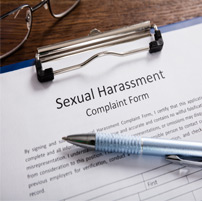 For far too long, hotel workers, particularly female housekeeping staff, have had to endure sexual harassment by hotel customers. Traditionally, management has taken the position that the “guest is always right.” This amounts to an expectation that hotel workers will endure harassment as part of the job.
For far too long, hotel workers, particularly female housekeeping staff, have had to endure sexual harassment by hotel customers. Traditionally, management has taken the position that the “guest is always right.” This amounts to an expectation that hotel workers will endure harassment as part of the job.
A series of events have enabled a positive turn in protecting these workers from sexual harassment. The #MeToo and Time’s Up movements have raised awareness of the plight of victims who had previously felt intimidated into silence, but are now speaking out.
Unite Here, a labor union representing hospitality workers in the hotel, food service, and other related industries, has made strong inroads into measuring the extent of the problem and pushing for protections for housekeeping workers.
Survey Findings
In its recent survey of members on their working conditions, Unite Here found that more than half of their hotel worker members reported having been sexually harassed by a guest. Most of those who reported being harassed did not feel safe on the job afterwards.
What can be done to address harassment of hotel housekeeping staff?
To date, there has not been an easy solution to the problem. While many hotels have developed sexual harassment programs to protect workers from harassment by co-workers and managers, the problem of guests harassing workers has been harder to address.
Panic Button Devices
Thanks to newer technology and greater concern for preventing sexual harassment, a feasible solution has been found to address the problem.
A couple of different types of portable panic button devices have been developed for employees to carry as they work. In the event the employee feels they are in danger, they can activate the device to summon help.
One device simply emits a loud alarm, alerting others in the area of a problem. A more sophisticated device has a Global Positioning System (GPS) capability that can send a signal to a monitor. Assistance can then be sent to the endangered employee’s location.
Laws to Require Panic Buttons are On the Rise
The issue is getting the attention of employers and legislatures throughout the country. Unite Here recently worked with local officials in Chicago to pass a “Hands Off Pants On” ordinance. It mandates hotels in the city provide panic buttons to all hotel housekeepers who work alone. The effort has been duplicated in numerous cities and states.
In New Jersey, Senate bill 2986 was introduced and referred to its labor committee; House bill A4439 was similarly introduced and referred to its labor committee. The proposed laws would require all hotels to provide panic buttons to hotel employees if they are assigned to work in a guest room without any other employees being present. In discussing the proposed legislation, Atlantic County Assemblyman Vince Mazzeo stated, “It is necessary that we ensure hotel employees are never subject to these situations.” Requiring hotels to “have panic buttons on their person will help to make our employees feel less alone and, most importantly, less afraid to work on their own, especially if the room they are servicing is occupied.”
The device would be provided to the employees free of charge. An appropriate staff member must respond promptly to the location of the employee when the device is activated. The bill would also require the hotel employer to conduct investigations of guests accused by employees of wrongdoing.
Cape May Sexual Harassment Lawyers at Levine, Staller, Sklar, Chan & Brown, P.A. Represent Sexual Harassment Victims
Being the victim of sexual harassment is an intimidating experience. The Cape May sexual harassment lawyers at Levine, Staller, Sklar, Chan & Brown, P.A. understand the difficulties you face. Let one of our experienced sexual harassment lawyers work out a path forward with an aim to prosecute the offender and help you recover your dignity. Call 609-348-1300 or contact us online to schedule a free initial consultation. We represent clients in Atlantic County, Ocean County, and Cape May County.
